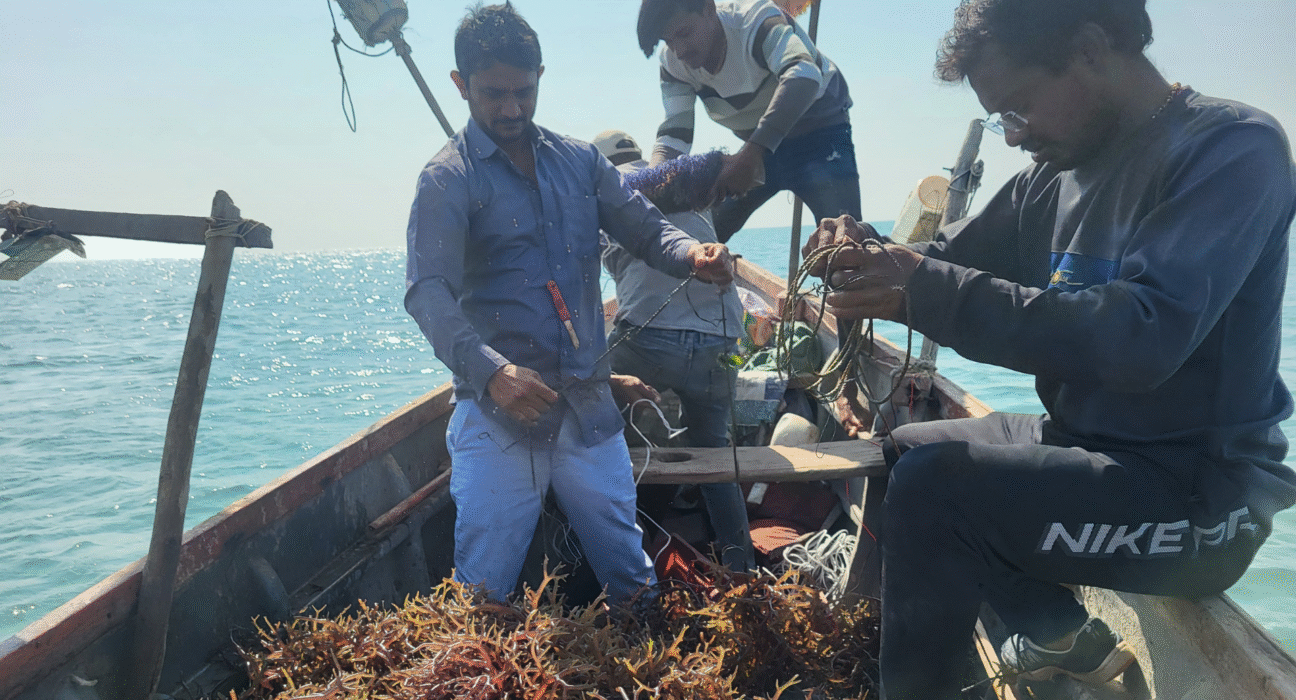Authored by: Diya Rao Jaini, St. Stephen’s College
The distinction between traditional and modern scientific knowledge arises from the infusion of power in the dissemination and perception of knowledge.
Varsha Mathew, MRC Intern, through fieldwork in Cherthala, Kerala, notes how fishermen used stars to navigate before the advent of technology (2025).
Coastal commons are natural resources and spaces which can be accessed and used by all members of a community.
Introduction
Indigenous technical knowledge is an essential source to consult for the development of comprehensive interventions in maritime policy. There is a multiplicity of definitions which emerge from a discussion on indigenous technical knowledge. These raise questions of power, marginalisation and exclusion – themes which remain relevant to understanding the role of indigenous technical knowledge in the process of policy formulation. Through an analysis of historiography around the definition of ‘indigenous technical knowledge’ and its connotations, this article identifies two issues associated with its use in knowledge dissemination and suggests ways in which this knowledge can be incorporated in maritime policy. Though it is important to acknowledge its importance, one must be cautioned against the romanticisation of indigenous technical knowledge. Like any other source, it must be treated with care, and corroborated with other data to produce comprehensive work.
Arriving at a Definition
An important assumption to dispel when defining indigenous knowledge is that it is simply composed of observations, and disseminated through folklore and wisdom. Indigenous knowledge is local knowledge – unique to a particular culture or society, and is the basis for decision making at the local level. It develops in contrast to an international knowledge system, which is generated by universities, research institutions and private firms.Indigenous technical knowledge is a body of knowledge built by a group of people through generations of living in close contact with nature (Johnson, 1992). It includes a system of classification, empirical observations about the local environment and a system of self-management which governs the use of resources.
Indigenous technical knowledge gained international recognition through documents like the World Conservation Strategy and Our Common Future. These reports emphasised the need to use locals’ environmental expertise to manage local resources. Johnson highlights the need to develop a science based on the priorities of local people and creating a technological base which blends traditional and modern approaches to solve problems. Such comprehensive solutions can help achieve the sustainable management of natural resources (1992).
Van der Bleikand and van Veldhuizen hold that indigenous knowledge consists of ideas, experiences, practices, and information either generated locally or elsewhere, but transformed elsewhere and incorporated into local lifestyles. It includes local, technological, cultural, and socio-economic aspects (1993). Chadwick notes the interaction between people and the environment as central to shaping indigenous knowledge. Complex conditions inform the environment, including physical, biological, economic and socio-cultural norms. The stakeholder responds to these conditions, which inform their knowledge of the environment (1998). These definitions note the centrality of transformation and dynamism in indigenous knowledge, and highlight its adaptability to contemporary circumstantial requirements. They also view the holder of indigenous knowledge as an active stakeholder who actively produces this knowledge through experience and observations, and present requirements.
Two primary issues emerge from a discussion of the definitions of indigenous knowledge. It is crucial to acknowledge the epistemological framework in which indigenous knowledge operates to understand why its use as a source is approached with hesitation. This framework can be located in the nexus of knowledge and power. Secondly, there is a notable disjunct between policy and reality. While there has been significant movement in the inclusion of indigenous knowledge sources in policy making, the reach of these policies remains limited – thus failing to benefit some of the primary stakeholders for whom the policy was drafted in the first place.
Power-Knowledge Nexus
The distinction between traditional and modern scientific knowledge arises from the infusion of power in the dissemination and perception of knowledge. The objective of discussing this distinction is to understand how knowledge is categorised, how these categories are employed, and the limitations of their use. While indigenous technical knowledge is characterised by terms like ‘local’, ‘indigenous’, and ‘traditional’ – all of which connote different emphases – scientific knowledge is associated with standards like prediction, rationality, and objective, testable explanation. Mazzochi notes the tendency to pedestalise modern science and thus reinforce these hierarchies (2018). The popular perception that indigenous technical knowledge consists solely of wisdom through stories and folklore, and therefore lacks objectivity and rationality, fuels these hierarchies. It is seen as subordinate to Western science because of an imbalance of power. Cultural barriers also prevent the mutual acknowledgment of the value of indigenous technical knowledge and Western science by each other.
The reconciling of two distinct world views comes with many issues. While Western science is based on reductionism, positivism, and objectivity, indigenous technical knowledge is more holistic, subjective, and experiential. Since it is predominantly an oral-based knowledge system, it is also more difficult to transmit ideas to those who do not share the same tradition and experience (Johnson, 1992). To be able to effectively use indigenous technical knowledge as a source, it is essential to understand that Western science and indigenous systems follow radically different methods of knowledge creation and validation. Indigenous technical knowledge is generated, recorded, and transmitted differently than Western scientific knowledge. Therefore, analysing one using the criteria prescribed by the other is precarious and may lead to inappropriate research results (Mazzochi, 2018). It is key to study the possibilities for collaboration between local communities and policymakers, to allow for and strengthen the development of more inclusive, locally-informed policies.
Disjunct between Policy and Reality
Despite efforts to integrate traditional knowledge into policy frameworks, their reach and implementation remain limited. With growing industrialisation, the coast and the underwater domain emerge as vulnerable spaces. The rise of mechanised fishing – particularly the use of equipment like bottom trawlers – leads to declining fish stocks, which are further exacerbated by pollution generated by the tourist economy through coastal resorts and hotels. These are all provisions of India’s policy to boost its Blue Economy (Pandey, 2025). On recognising this vulnerability, the Government of India drafted the National Policy on Marine Fisheries in 2017. Two of its primary pillars were to address habitat conservation and to secure tenure rights and livelihoods of traditional fishers. However, the lack of a detailed action plan and insufficient budgetary support hindered its implementation. Such lackluster government initiatives isolate and disenchant local communities, making it more difficult for them to contribute to policy formulation.
They are collectively locally governed by community-decided rules of resource extraction, management, use and conservation.
While many legal frameworks like the 2006 Forest Rights Act and the 2011 Coastal Zone Regulation notification, have provisions for coastal protection and governance, local institutions like the Kadal Kodathi (translating to ‘sea court’ in Malayalam) of Kerala and the Ooru Panchayats in Tamil Nadu are key in determining the rules to guide community interactions in the coastal commons. As industrialisation extends from the waterscape into the coastal land, modern policy increasingly isolates local institutions. As a result, coastal governance – which was once rooted in community systems and indigenous technical knowledge, and aimed to balance ecological security and the claims of multiple users – now exists merely as a process to facilitate the capture of space and resources by a few private companies (James and Udayashankar, 2022). Unrestricted access to coastal commons is essential for fisher communities. Fishing requires the waterscape and the adjoining shore. The relocation of fisher communities away from the coast is thus dangerous. Unrestricted access is necessary to effectively plan fishing trips by analysing weather conditions and other relevant factors. Restricted access to commons, especially as they increasingly lose out to private stakeholders, creates livelihood loss and displacement (Dakshin Foundation, 2018).
Solutions and the Way Forward
An idea of the current state of the integration of indigenous technical knowledge into policy frameworks in India emerges from the above discussion. This can be further facilitated through a greater focus on the co-production of knowledge. Such work is being conducted, as seen through the study conducted by the Mangalore Research Centre of the Central Marine Fisheries Research Institute to show the scientific rationale behind indigenous knowledge. The study, titled ‘Indigenous Technical Knowledge and Ancient Proverbs of the Coastal Fisher Folk of Kerala and their Implications’, reconciles traditional and modern scientific knowledge by studying proverbs in the fishing villages of Maruvakkad and Mallipuram in the Ernakulam district. These communities noted that dark patches in water are indicative of the presence of mackerel. This is backed by the science that the colour of the water changes due to the changing penetration of light through the shoal. They also noted how a strong fishy odour implies a large concentration of fish, due to the smell of the mucus discharged by them (2006).
These studies show the value in encouraging a participatory approach. Such a method ensures that information is gathered from both sources of knowledge, and both are involved in its analysis. This method follows the mutual exchange of knowledge between scientists and holders of traditional knowledge in plain language to facilitate the scientific aspect of the project (Inuit Circumpolar Council, 2025). Community-based mapping and monitoring of data can thus lead to more comprehensive policy formulation. Such a method must be employed with a broad understanding of traditional knowledge, and an active acknowledgment and understanding of its unique methodologies and objectives. These suggestions can only come to fruition with better archiving and documentation of traditional knowledge.
Not only will committing this knowledge to the written word give it more legitimacy, but it will make it accessible to scholars across the world, to ensure that indigenous technical knowledge is not brushed off as a subordinate source. Instead, the detailed, careful attention to the use of indigenous technical knowledge will establish its use to develop holistic, locally-informed policies.
References

Diya Rao Jaini
About Author
Diya studied History at St. Stephen’s College, University of Delhi. At MRC, she completed her research internship in ‘Marginalisation and Revival of Traditional Indigenous Knowledge,’ where she explored the significance of preserving local maritime practices and their role in sustainable ocean governance.


